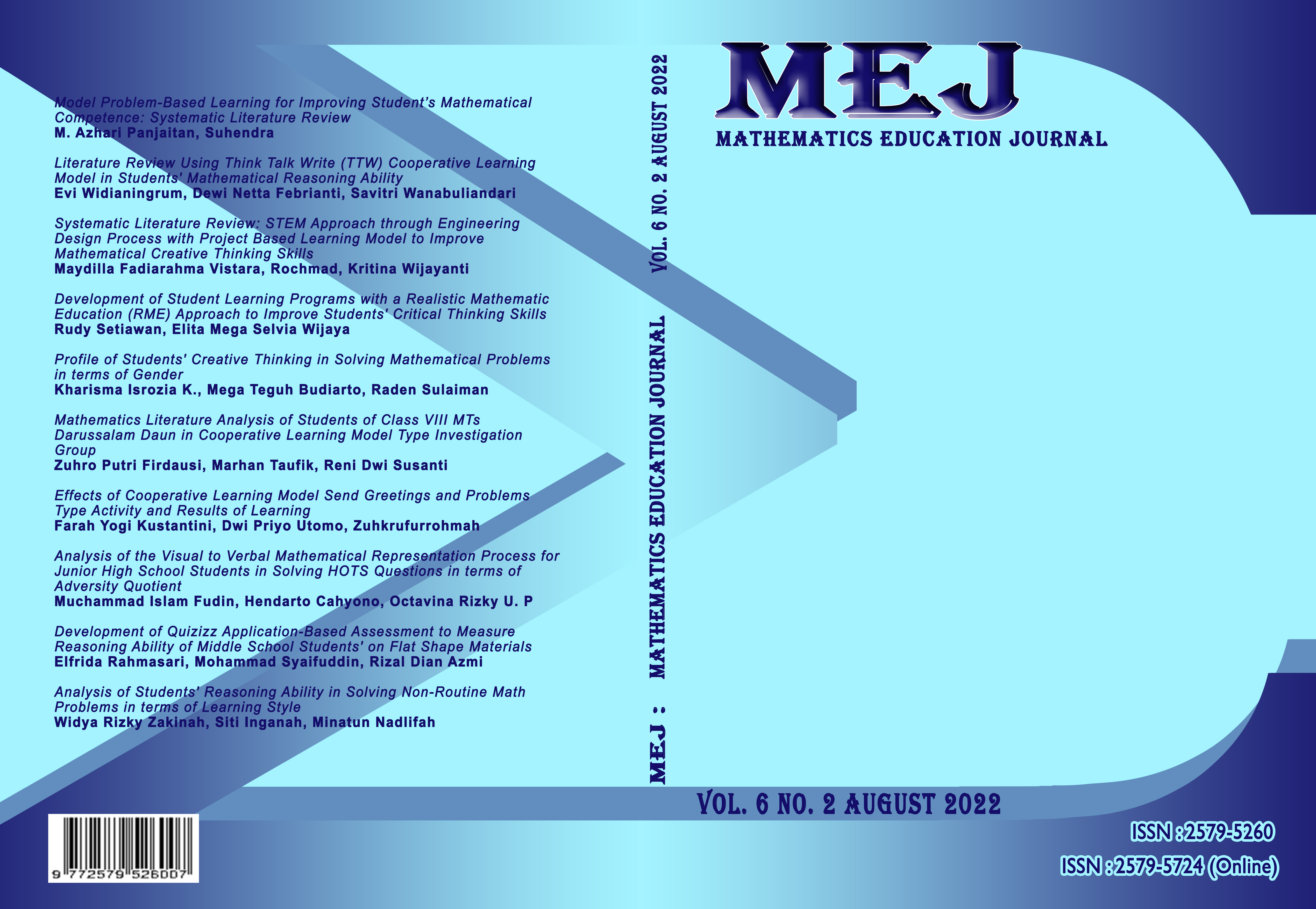Development of Student Learning Programs with a Realistic Mathematic Education (RME) Approach to Improve Students' Critical Thinking Skills
DOI:
https://doi.org/10.22219/mej.v6i2.20174Abstract
This study aims to produce student worksheets with a Realistic Mathematic Education (RME) approach to solving valid, practical, and effective linear program problems. The development of this learning program is based on the Four-D Model adopted from Thiagarajan, Semmel, namely defining(define), design (design), and action (develop). The implementation of the criteria set by conducting validation and field trials. The learning tools developed are in the form of RPP and MFI. The subjects of the development trial were students of the mathematics education study program. Based on the results of data analysis, mathematics learning programs with a Realistic Mathematic Education (RME) approach can be applied and carried out correctly. This is shown from the results of the MFI trial with an average score of 83, which is included in the excellent category. In addition, the test questions test got an average score of 86.8, which also fell into the outstanding category. From this, it is known that the student learning program is ethical and practical for learning.
Downloads
References
Arifendi, Rio, Setiawan, R. (2019). Upaya Peningkatan Penalaran Matematis Student Universitas Tribhuwana Tunggadewi Melalui Pendekatan Cotextual Teaching Learning (CTL). Jurnal Prismatika, Vol. 1, No. 2: 55-59.
Fauzan, A. (2002). “Applying realistic mathematics education in teaching geometry in Indonesian primary schools.” Disertasi doktor, University of Twente.
Hendriana, H., dkk. (2018). Hard Skills dan Soft Skills. Bandung: PT Refika Aditama.
Riduwan. (2012). Skala Pengukuran Variabel-variabel Penelitian. Alfabeta: Bandung.
Shoimin, A. (2017). 68 Model Pembelajaran Inovatif Dalam Kurikulum 2013. Yogyakarta: Ar-Ruzz Media. Dari Perpusnas, (Online), (https://opac.perpusnas.go.id), diakses 14 Februari 2022.
Siswono, T. Y. E. (2018). Pembelajaran Matematika Berbasis Pengajuan dan Pemecahan Masalah. Bandung: Remaja Rosdakarya.
Sudarman, S. W. Dan Linuhung, N. (2017). Pengaruh Pembelajaran Scafolding Terhadap Pemahaman Konsep Integral Student. Aksioma: Jurnal Pendidikan Matematika. 6(1): 33-39.
Sumarmo, U., dkk. (2017). Hard Skills and Soft Skills Matematik Siswa. Bandung: PT Refika Aditama.
Titin ,P,A.Rubhan M, & Dona, D, P. (2018). Pengaruh Model Pembelajaran Tandur Terhadap Peningkatan Kemampuan Pemahaman Konsep Dan Penalaran Matematis Peserta Didik.
Wahyuni, Sri. (2019). Pengaruh Model Pembelajaran Project Based Learning Terhadap Kemampuan Pemahaman Konsep Student Mata Kuliah Kapita Selekta Matematika Pendidikan Dasar Fkip Umsu . Jurnal Edutech. Vol 5, No. 1.
Widodo, F. (2014). Pemahaman Konsep Matematis, (Online), (Digilib.Unila.Ac.Id/1810/8/Bab%20 %20ii.Pdf) Diakses 15 A.
Wijaya, E. M. S., & Irianti, N. P. (2017). Whole Brain Teachig Sebagai Desain Pembelajaran Matematika Yang Kreatif. MUST Journal of Mathematics Education Science and Technology 2(2):1976.
Wijaya, K. A. & Ariyadi. (2019). Efektivitas Penggunaan "Proofs Without Words" Dalam Pembelajaran Matematika Dengan Menggunakan Discovery Learning Ditinjau Dari Pemahaman Konsep, Kemampuan Representasi Matematis Dan Berpikir Kritis.
Yusri, R. (2017). Pengaruh Pendekatan Problem Centered Learning Terhadap Kemampuan Pemahaman Konsep Dan Pemecahan Masalah Matematis Siswa. 3 (2).
Wijaya, E., & Irianti, N. (2017). Whole Brain Teaching sebagai Desain Pembelajaran Matematika yang Kreatif. Must: Journal of Mathematics Education, Science, and Technoloogy, 2(2), 196–207.
Wijaya, E., & Irianti, N. (2021). Meningkatkan Kemampuan Berpikir Kritis Student Melalui Realistic Mathematic Education (RME): Jurnal AKSIOMA, 10(2), 648–658.
Downloads
Published
Issue
Section
License
Copyright (c) 2022 Rudy Setiawan, Elita Mega Selvia Wijaya

This work is licensed under a Creative Commons Attribution-ShareAlike 4.0 International License.
Authors who publish with MEJ (Mathematics Education Journal) agree to the following terms:
For all articles published in MEJ, copyright is retained by the authors. Authors give permission to the publisher to announce the work with conditions. When the manuscript is accepted for publication, the authors agree to automatic transfer of the publishing right to the publisher.
Authors retain copyright and grant the journal right of first publication with the work simultaneously licensed under a Creative Commons Attribution-ShareAlike 4.0 International License that allows others to share the work with an acknowledgment of the work's authorship and initial publication in this journal.
Authors are able to enter into separate, additional contractual arrangements for the non-exclusive distribution of the journal's published version of the work (e.g., post it to an institutional repository or publish it in a book), with an acknowledgment of its initial publication in this journal.
Authors are permitted and encouraged to post their work online (e.g., in institutional repositories or on their website) prior to and during the submission process, as it can lead to productive exchanges, as well as earlier and greater citation of published work (See The Effect of Open Access).

This work is licensed under a Creative Commons Attribution-ShareAlike 4.0 International License.










